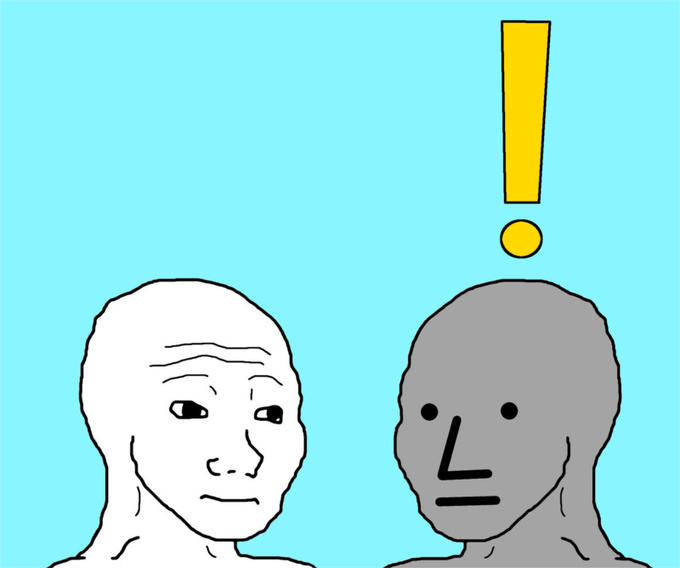Occasionally some people get thoughts about everyone around them being pre-programmed robots meant to make their life harder. Most people think this idea is false, but what if I told you it was true? What if I told you that some people may have given up thinking and got others to think for them? It may seem ridiculous, but some users on 4chan have created a meme to reflect this sentiment, in come the NPC meme.

Now that I've introduced everyone to my good friend NPC Wojak, now we can talk about how this relates to class. In Song Of Solomon, Pilate breaks free from the norm and thinks for herself. This is not to say the bystanders still living their normal lives were in any way "NPCs" with worthless lives, it simply states that Pilate has broken away from the predominant culture. I used to think that our generation, gen Z, is a more rational and reasonable generation, but from the blog topics I heard on monday, I guess not. Most people in our school base their opinions on mainstream media and English excerpts read in class. Few people, even in our class, act like Pilate and deviate from the norm.
Those of you who already know the NPC meme (and aren't big fans) are probably pretty upset that I could say something so rude and offensive about other human beings. People tend to feel offended when one decides to not abide by the groupthink, similar to how many people in Song of Solomon felt offended by Pilate's lack of a naval. When people give up their free thought and let others think for them, they in turn lose their humanity.
This is not to say that these "NPCs" are worthless and don't deserve to live, it simply mean that people who lack critical thought are annoying to listen to for anyone with critical thought. For example, a person with critical thought could ask "Does the wage gap exist?" to one who leaves their thinking to hack news channels like CNN, and the response would always be the same. Now you may say that people who watch Fox News would have a similar non-thought out response, and I would agree with you. However, the key difference between an NPC and a critical thinker would be found easily after asking the question of "Why does(n't) the wage gap exist?". The NPC likely wouldn't give you an answer (or dance around the question), while the critical thinker would tell you facts and statistics to prove that the wage gap, in fact, does not exist. (hmu if you want those facts)
This may seem unrelated to Song of Solomon, but it really isn't. All of Pilates decisions throughout the book are rational and well thought out. Pilate doesn't let others think for her, and instead thinks for herself.
If Pilate can do it, why can't you?

